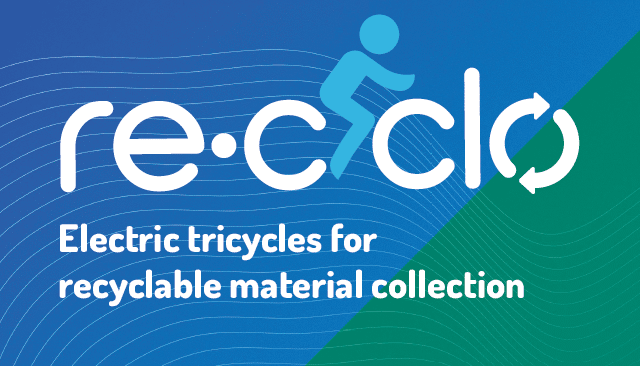By Karla Hernández and Victor Valente
In 2020, the city of Fortaleza went the extra mile to rethink door to door solid waste collecting. To make collection more efficient and improve the working conditions for waste collectors in the city, the municipality, with technical support from the Transformative Urban Mobility Initiative (TUMI Initiative) and the engaged work of accredited waste-collecting associations, implemented “RE-CICLO.” The pilot project promotes the use of electrically assisted tricycles in recyclable waste collecting.
As RE-CICLO’s first phase is coming to an end and Fortaleza prepares to implement its second phase, there has been some reflection about what’s been learned. How they overcame challenges experienced throughout the transition process during which waste collectors moved from pushing around regular carts to e-tricycles have been shared in the handbook “RE-CICLO: electric tricycles for recyclable material collection.”
Presenting the most important steps taken during project planning and implementation, the handbook provides a set of recommendations, such as how to train waste collectors on riding the tricycle. It offers overall considerations for the replication of a project like RE-CICLO in other cities.
We took the time to understand the challenges. We listened. We had to learn that we were the outsiders and that our ideas cannot be imposed, but rather discussed and improved collectively with active participation and with input from the waste collector and the associations.
Tais Costa, Cordinator of Fortaleza’s Innovation Lab
Time, engaged partners and empathy: keys to RE-CICLO’s success
RE-CICLOS’s success is the result of hard work and constant communication. Tais Costa, Cordinator of Fortaleza’s Innovation Lab highlights two issues that played a key role on implementing RE-CIC, LOo:
“First of all, time. We took the time to understand the challenges. We listened. We had to learn that we were the outsiders and that our ideas cannot be imposed, but rather discussed and improved collectively with active participation and with input from the waste collector and the associations.”
“There were many unknown facts that made us stop and rethink: from not knowing if waste collectors would be able to drive a fully loaded tricycle or if the tricycle models would fit in the association’s warehouses,” notes Costa. “Coming up with sustainable solutions was only possible by building a solid and close relationship with the associations and individual waste collectors.”
As Nirlania Leite, the project manager at Fortaleza’s Innovation Lab points out, having an engaged partner and being empathic to their needs allowed both the team from the municipality and TUMI to land the prototype that would be used. “We managed to get the size, the bike dimensions, baskets and cart right, so that waste collectors could transition from human powered vehicles to electric-assisted bikes that allow them to serve the community more efficiently.”
Another important step was the door-to-door campaign. “Some waste collectors were very hesitant about doing the campaign. We couldn’t understand why they were so shy about carrying out the campaign. The fact was that they couldn’t imagine the idea of having to talk to people, to the business owners. What seemed logical to us (making sure people knew about their service) was so strange to them, because their work is often disregarded. As they shared these concerns with us, we were able to find an alternative strategy that would, in the end, help them overcome this fear of conducting the door-to-door campaign and in fact increase their material collected in these establishments,” says Leite.
“For scaling up, it is also important to support the associations in professionalization. Even though the e-tricycles helped change the perception society has about waste collectors in Fortaleza, they are still a very vulnerable group of workers. It’s not only about supplying the means but also transforming the perception of the entire waste management process and the service the collectors provide to the city”
Victo Valente, TUMI Technical Advisor
Can RE-CICLO happen in other Brazilian or South American cities?
The advisory team at TUMI believes that a project such as RE-CICLO can happen in other cities. Victor Valente, senior advisor at TUMI believes that as long as the local associations of waste collectors or even any individual’s concerns and ideas are considered part of the project. Mr. Valente points out that a project of this nature must be developed in a participative and tailormade manner.
“For scaling up, it is also important to support the associations in professionalization. Even though the e-tricycles helped change the perception society has about waste collectors in Fortaleza, they are still a very vulnerable group of workers. It’s not only about supplying the means but also transforming the perception of the entire waste management process and the service the collectors provide to the city.” Highlighted Mr. Valente as a final remark.
“RE-CICLO: electric tricycles for recyclable material collection” was a handbook published based on the pilot project by the Municipality de Fortaleza with the support of TUMI, implemented by the Deutsche Gesellschaft für Internationale Zusammenarbeit (GIZ) on behalf of the Ministry for Economic Cooperation and Development (BMZ).
